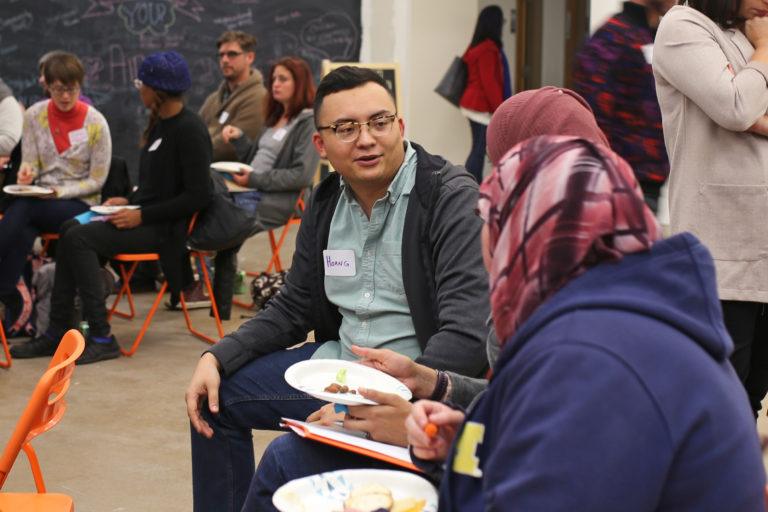Foster Advocates

It wasn’t until Hoang Murphy returned home from college that he realized how lucky he was. Nationwide, only about half of youth raised in foster care end up finishing high school and less than 3% graduate from a 4-year college. Hoang, who was in foster care growing up, surpassed that goal. After being the first in his family to graduate from college, he went on to get his master’s degree. After that, he worked for the Obama team. When he came back to Minnesota, his younger brother was living in a car just six months after graduating high school.
“If it takes a village to raise a child, it takes a village to fail one.”
Hoang Murphy, Founder/Executive Director, Foster Advocates
“When I was going to college, my younger brother was going to prison,” said Hoang. “His story is the much more common story: 60-70% of our young men in foster care go to prison by the age of 26.”
Speaking up for foster care youth

Hoang wanted to make people care about foster kids and for their voices to be heard at the tables where decisions were being made on their behalf. Hoang reached out to more than 20 other organizations about taking on the work of foster care advocacy; all declined for various reasons. Finally, he decided he’d be the one to help bring voice and awareness to youth in foster care and those who have aged out of the system.
“I knew what it felt like to be in foster care,” said Hoang. “I knew what it was like to not know where I was going to spend Thanksgiving, or what it’s like when people are describing growing up and knowing that you can’t be part of the conversation because it would ruin their day.” He knew that if this work was going to be done by someone deeply familiar with the issues, he was going to have to take it on.
Finding a fit with fiscal sponsorship
When Hoang approached Propel Nonprofits, he said he never wanted to start a nonprofit – “that’s probably why they took me on as a fiscal sponsee!” he laughed. He explored a lot of different models for the work he wanted to do and realized fiscal sponsorship was the perfect vehicle to get the work started, even if a nonprofit model works better longer-term. Propel’s fiscal sponsorship program handles much of the back-end administration – administering grants, fund management, working with Hoang on financial reports for his board, and other logistics – so he can focus on things like setting a legislative agenda and being in the community listening to needs and raising awareness. “Propel doesn’t take on projects that aren’t values-driven and that aren’t looking for a true change,” said Hoang. “That’s why I went with Propel.”
Hoang’s fiscally sponsored organization launched in May 2018 as Foster Advocates. Over the past year, Foster Advocates has been advancing its mission of fostering advocacy, policy change, and organizing by partnering with current/former foster youth and impacted communities. As is common with small, start-up organizations, the board plays an especially active role, so Hoang knew it would be valuable to have everyone clear on expectations and goals. He and the board have been working with Jenny Kramm, a strategic services consultant at Propel, to do a business model canvas to clarify Foster Advocates’ priorities, set a plan, and get on the same page about board roles and responsibilities.
We can’t care about what we don’t know
One of the challenges of Foster Advocates’ work is the lack of awareness and data about youth who have been in foster care and their outcomes afterward. “If the adage ‘we measure what we value’ means anything, then we don’t care about our kids because in Minnesota we don’t measure the outcomes of kids who age out of foster care,” said Hoang. “Parents check in on their kids and see how they’re doing. That’s not something the state does for its kids.”
The statistics available are grim. In a 2017 Hennepin County Voices of Youth Count survey, 27% of kids in homeless shelters in Hennepin County had spent time in foster care. Minnesota’s foster care re-entry rate is 26%, compared to 9.9% nationally (some additional context on that here).
Just as many of Minnesota’s achievements break down when you look at racial disparities, child welfare is no different. The State’s foster care system disproportionately affects kids of color: American Indian children were 18.5 times more likely, African American children were more than 3.0 times, and those identified as two or more races were 4.8 times more likely than white children to experience foster care, based on Minnesota population estimates from 2016. “These statistics are damning,” stated Hoang. “We can’t simply accept that more people of color abuse their children – we have to look at the racial breakdown of who gets served versus who gets squeezed in Minnesota.”
Hoang argues that we as a community share responsibility for all our kids. “If it takes a village to raise a child, it takes a village to fail one,” he notes. “These kids are going to grow up and who they become is up to us, all of their caretakers. I take that responsibility seriously.”
Hoang’s hope is that through the work of Foster Advocates, more people will become aware of the hurdles facing kids who have been part of the foster care system. Even more importantly, he hopes that when they do learn more, they’ll keep talking about it. “When you don’t hear about foster care kids in the conversation, you need to ask,” urges Hoang. “I started this work because I thought people didn’t care, and what I’ve realized through every conversation is as soon as you talk to them about it, you realize they do care once they know.”
Become a foster care advocate
There are many ways to support the work of Foster Advocates and foster kids:
- Read Hoang Murphy’s piece in Pollen’s Unbound series on education
- Donate to Foster Advocates
- Sign up for their newsletter
- Contact your elected representatives about data reporting requirements in ESSA/All Kids Count Act
- Consider becoming a Guardian Ad Litem
Related Services
-
Fiscal Sponsorship
Propel Nonprofits’ fiscal sponsorship program works with dozens of mission-driven organizations, projects, causes, and collaborations to test drive new ideas as you build infrastructure, set goals, develop your business model, and get your big idea off the ground.
-
Strategic Consulting
As a leader, you want to make sure your organization has a shared vision for the future, and the strategy to get there. Propel Nonprofits’ consultants are experienced at providing strategic planning, board development, and other strategic services to organizations
